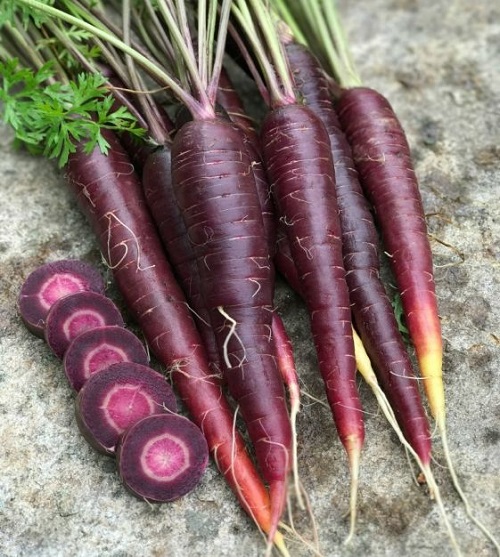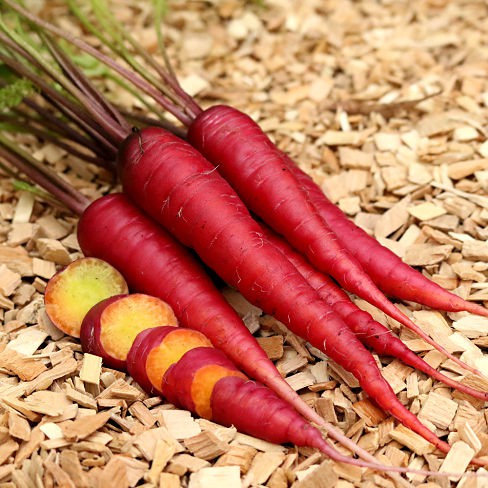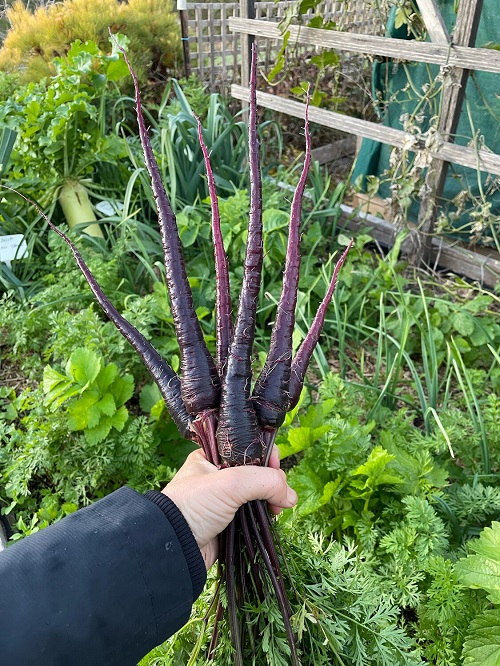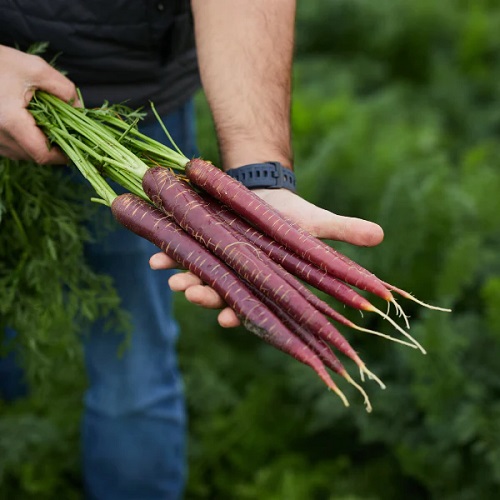We bring you the most delicious Purple Carrot Varieties that you can grow easily in your garden for a bountiful harvest!
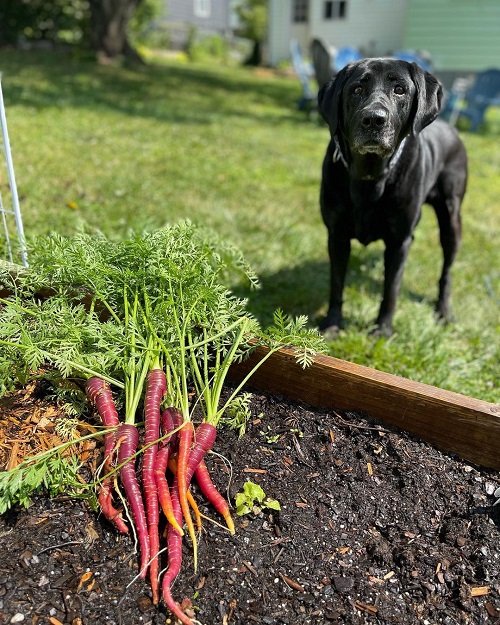
These Purple Carrot Varieties come with a twist – offering the best combo of color and taste! Keep on reading the explore the tastiest ones!
What are Purple Carrots
Purple carrots are a variety of carrot that, as the name suggests, have a purple hue. While the most commonly encountered carrots are orange, carrots actually come in a variety of colors including yellow, red, and purple.
The purple carrots are rich in both flavor and nutrients and are known for their deep, vibrant color which can range from dark violet to a lighter lilac shade.
Christmas Cactus Turning Purple | 7 Reasons and Solutions
How Do Purple Carrots Get Their Coloring
The purple color in these carrots is primarily due to the presence of anthocyanins. Anthocyanins are a type of flavonoid, which is a class of compounds with antioxidant effects.
The anthocyanins are water-soluble pigments that are found in the cell vacuole, usually in flowers and fruits but also in leaves, stems, and roots. In the case of purple carrots, these pigments are found in high concentrations in the root.
Are Purple Carrots Man Made or Natural
The purple carrot is actually closer to what wild carrots used to look like. The original carrot cultivated in regions like Persia (modern-day Iran and Afghanistan) thousands of years ago was purple or yellow, not orange. The orange carrot that we are most familiar with today was developed in the Netherlands in the 17th century, and it was selectively bred for its high beta-carotene content, which gives it its orange color.
Here’s everything you need to know about growing carrots
So, to answer the question, purple carrots are natural and have been around for a very long time. However, modern agricultural practices have also led to new varieties of purple carrots that may have been selectively bred for certain traits like taste, size, and color stability.
In summary, purple carrots are both a naturally occurring and historically significant vegetable. Their deep color comes from anthocyanins, which also provide additional health benefits compared to their orange counterparts.
Purple Carrot Varieties
1. Purple Haze Carrot
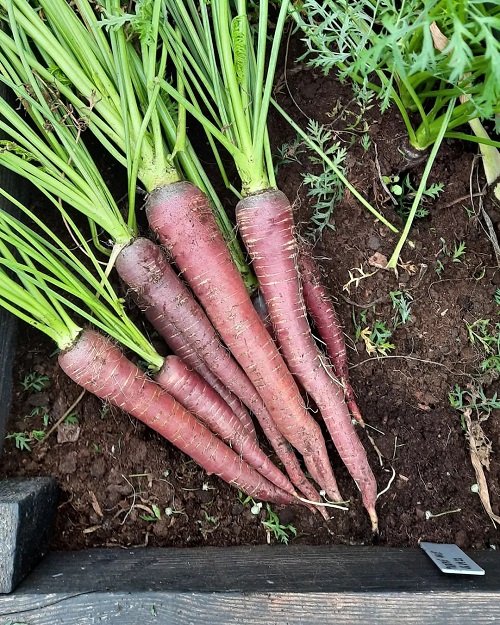
Flavor: Slightly sweet and earthy flavor with a hint of spiciness.
Maturity: 70-80 days
Health Benefits: Offers potential antioxidant and anti-inflammatory benefits, support vision, and immunity
Originating from the Middle East and Mediterranean regions, these Purple Carrot Varieties are a nutritional powerhouse due to abundant anthocyanins and essential vitamins A and K, making them visually appealing and healthful.
2. Dragon Carrot
Flavor: Sweet and slightly peppery taste.
Maturity: 65-75 days
Health Benefits: Promote healthy skin, and contribute to a strong immune system and overall well-being.
Dragon carrots captivate with their stunning purple skin and contrasting orange flesh. Their unique appearance hints at their extraordinary nutritional value; packed with beta-carotene and antioxidants.
3. Purple Sun Carrot
Flavor: Mild and subtly sweet flavor with a pleasing crunch.
Maturity: Around 80 days
Health Benefits: Offers antioxidant benefits that combat oxidative stress, supporting vision, immunity, and heart health.
These Purple Carrot Varieties boast a uniform and deep purple hue throughout its roots is rich in anthocyanins and is a good source of vitamins A and potassium, making them a valuable asset to a well-rounded diet.
Stunning Purple Calla Lily Varieties
4. Cosmic Purple Carrot
Flavor: Slightly spicy and earthy flavor.
Maturity: Around 70 days
Health Benefits: Supports skin health and immune function.
Cosmic Purple carrots with their unique flavor are coupled with a blend of nutrients including beta-carotene and antioxidants making them a star among root vegetables, offering a visual and gustatory feast.
5. Purple Elite Carrot
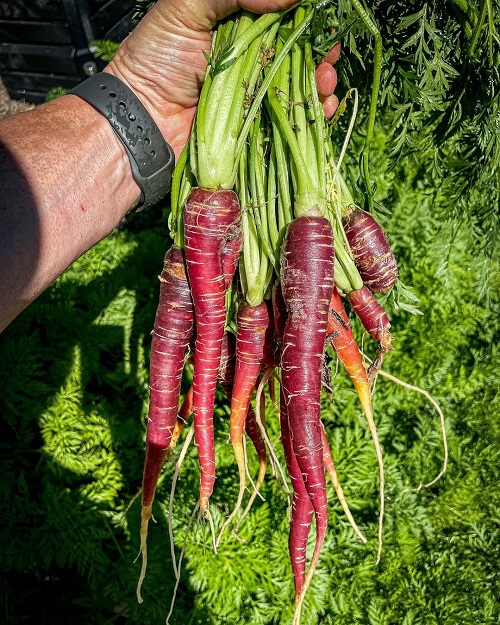
Flavor: Pleasantly sweet taste with a subtle hint of spiciness.
Maturity: 68-70 days
Health Benefits: Support overall well-being by combating oxidative stress.
These Purple Carrot Varieties, with their deep purple allure and hints of culinary excitement are abundant in anthocyanins and antioxidants. They offer a visual and nutritional feast, providing a medley of benefits to enhance both the plate and well-being.
6. Maroon Carrots
Flavor: Slightly sweet and earthy flavor with a subtle nutty undertone
Maturity: 70-75 days
Health Benefits: Supports heart health, and eye health, and boosts the immune system.
Maroon carrots share a common ancestry with the orange ones and contain valuable nutrients and antioxidants. Their distinct hue adds a touch of novelty to meals, making these Purple Carrot Varieties a delightful addition to both gardens and kitchens.
7. Black Nebula
Flavor: Mildly sweet and earthy flavor with hints of spice and nuttiness.
Maturity: 65-75 days
Health Benefits: Offers support for heart health, eye benefits, and immune system strength.
Black Nebula carrots, known for their deep, dark purple to almost black color. Packed with anthocyanins and other antioxidants, these Purple Carrot Varieties offer a burst of nutrients and a visual flair to dishes.
Find out the Vegetables that Look Like Carrots here
Growing Purple Carrots
Growing purple carrots in your home garden is a rewarding experience, not just for the delicious end product but also because they are relatively easy to grow.
Soil Preparation
- Choose the Right Soil: Opt for loose, sandy, and well-drained soil. Heavy or clay soils can lead to deformed carrots.
- pH Level: Aim for a soil pH between 6.0 and 6.8.
- Fertilization: Use a balanced fertilizer, but avoid excess nitrogen as it encourages leaf growth over root development.
Planting
- Depth and Spacing: Plant seeds 1/4 inch deep and space them 2-3 inches apart in rows.
- Watering: Keep the soil moist, especially during germination.
- Temperature: Carrots prefer cool temperatures for germination—around 50-75°F (10-24°C).
Maintenance
- Thinning: Once seedlings are about 2 inches tall, thin them to avoid overcrowding.
- Weed Control: Keep the garden bed free from weeds that can compete with carrots for nutrients.
- Watering: Maintain consistent moisture but avoid waterlogging the soil.
Follow Our Recent Article on When to Plant Carrots in Georgia here
Harvesting
- Maturity Signs: Carrots are usually ready to harvest 2-3 months after planting. The tops of the carrot roots will be visible at soil level when they’re ready.
- Method: Gently loosen the soil around the carrot with a fork before pulling it out to avoid damaging the root.
Additional Tips
- Pest Management: Use insect nets or row covers to protect against common pests like carrot flies.
- Rotation: It’s advisable to practice crop rotation to minimize disease risk.
Quick Purple Carrots Facts
- Oginated in the Middle East and Asia
- One of the earliest carrot varieties
- High in antioxidants, particularly anthocyanins
- Good source of vitamins A, C, and K
- Slightly sweeter than orange carrots
- Sometimes described as peppery or earthy
- Color may fade when cooked
- Best used in roasting, grilling, or raw in salads
- Linked to improved eye health
- May help reduce the risk of chronic diseases
- Found in farmers’ markets and specialty stores
- Increasingly available in mainstream supermarkets


